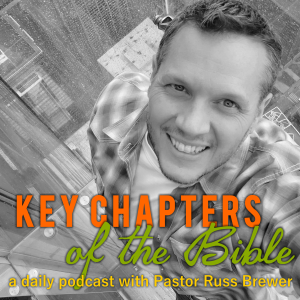
God is faithful to His people, even when they have been unfaithful to Him. We'll see this truth in today's study in Isaiah 50 as we study an amazing prophecy of Jesus which proves, not only that He is the promised king, but that He would also suffer for His people and won't divorce them even though they have been unfaithful to their covenant with Him. Join us today in our study in Isaiah 50!
DISCUSSION AND STUDY QUESTIONS:
1. The overarching theme of Isaiah 49-57 is that of the “Suffering Servant”. Think back to our study, yesterday, in Isaiah 49. What were some ways that Isaiah 49 prophesied that the Servant would suffer for His people?
2. Read Isaiah 50:1. What is the item that the Lord is asking about? What is His point in asking for this? What did the Lord tell Israel in Jeremiah 3:8? How did the podcast explain the juxtaposition of Isaiah 50:1 and Jeremiah 3:8?
3. In verses 2 & 3, could the Lord carry out the salvation of His people? If so, why “was there no man when...” the Lord came to His people? What does that phrase even mean? Why was there no one to obey the Lord?
4. In verse 4, once again the Servant is speaking (we know this because the word “GOD” is in all caps, indicating that “GOD” was the Lord and now His servant is speaking). What is the Servant’s message for His people in verses 4 & 5? Why do you think He won’t “turn back”? How was this evident throughout Jesus’ ministry? How is this different from the lack of obedience in the people in verses 2 &3?
5. What was the Servant’s obedience to the Lord in verses 5 &6? What was the price of Jesus’ obedience to the Father? How was this obedience demonstrated in Jesus’ earthly life? What cost was there in Jesus’ obedience?
6. Read over verses 7-9, how do these verses portray the trust that the Servant has for the Lord? What kind of resolve does this trust strengthen Him with? Read 1st Peter 2:23. How did Peter portray Jesus’ trust in the Father? Why is it hard to trust the Father like this, when life doesn’t seem to go our way?
7. Verse 10 calls out to the people to join with the Servant. What should those who walk in darkness do? What does it mean to call upon the Lord? How does Romans 10:13 echo a similar exhortation?
8. In verse 11, how is a person making their own fire an analogy for manmade religion? In our day and age, how do people seek to provide their own “light”? In verse 11, what is the ultimate fate of those who will not leave their manmade religion and obey the Lord? What torment do you think is being spoken of here?
9. Think about how you respond to God’s message. Are these just words on a paper? Are these just theological ideas to know? Or are these words God’s message to you to gather to Him, with His people, that you might be numbered among those in His kingdom?
Check out our Bible Study Guide on the Key Chapters of Genesis! Available on Amazon!
To see our dedicated podcast website with access to all our episodes and other resources, visit us at: www.keychapters.org.
Find us on all major platforms, or use these direct links:
Spotify: https://open.spotify.com/show/6OqbnDRrfuyHRmkpUSyoHv
Itunes: https://podcasts.apple.com/us/podcast/366-key-chapters-in-the-bible/id1493571819
YouTube: Key Chapters of the Bible on YouTube.
As always, we are grateful to be included in the "Top 100 Bible Podcasts to Follow" from Feedspot.com.
Also for regularly being awarded "Podcast of the Day" from PlayerFM.
Special thanks to Joseph McDade for providing our theme music.
More Episodes
 2024-06-20
2024-06-20
 2024-06-19
2024-06-19
 2024-06-16
2024-06-16
 2024-06-14
2024-06-14
 2024-06-13
2024-06-13
 2024-06-11
2024-06-11
 2024-06-08
2024-06-08
 2024-06-07
2024-06-07
 2024-06-05
2024-06-05
 2024-06-04
2024-06-04
 2024-06-03
2024-06-03
 2024-06-01
2024-06-01
 2024-05-31
2024-05-31
 2024-05-30
2024-05-30
Create your
podcast in
minutes
- Full-featured podcast site
- Unlimited storage and bandwidth
- Comprehensive podcast stats
- Distribute to Apple Podcasts, Spotify, and more
- Make money with your podcast
It is Free
- Privacy Policy
- Cookie Policy
- Terms of Use
- Consent Preferences
- Copyright © 2015-2024 Podbean.com





